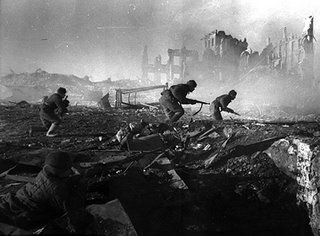Prairie Dogs?

This is coolbert:
Like prairie dogs in their warrens and mazes of tunnels the Hezbollah fighters are emerging from the rubble. A lot of them intact. This is probably what the Israeli general officers dreaded. An enormous bombardment from the air and ground and yet the enemy is not wiped out. Rather, has survived. Emotionally charged by their survival.
Historically, bombardments of a horrific nature have not always destroyed an enemy. Rather, have created a situation to the detriment of the attacker. A plus for the defender.
Such it was at Cassino and Stalingrad in World War Two [WW2].
The bombardment at Cassino created a mountain thoroughly pockmarked by craters and a ruined abbey at the top. Then defended AFTER the cannonading by German paratroopers of the Hermann Goering division. Best unit in the German Army. Best division in the best army in the world, fighting capacity wise. I would have to believe that allied troops struggling UP the mountain to get at the German defenders would have a tough enough time without the shelling and bombing creating a moonscape of the mountainside. With the moonscape impediment, my intuition tells me the going was even TOUGHER!!
[during World War One, entire sectors of the "front" were rendered "impossible" for military operations as the constant shelling had created a landscape where normal movement was impossible. These sectors became "quiet". Skeletal troops formations manning the trenches.]
The ruins of Stalingrad created a nightmare for the German attacker and the perfect circumstances for the Russian defender. Streets filled with rubble, impeding the movement of armor. Buildings with walls blown apart and holed. Allowing for the creation of excellent fighting positions. The Germans walked into a nightmare of their own making.
[the tenacity of the Russian defender under such circumstances just seems to be incredible. At the fortress of Brest-Litvosk, in 1941, the Russian defenders held out in the ruins of the fortress for thirty days, beyond all hope. Carved on the walls with a bayonet was this slogan, "we die but we do not surrender, farewell Motherland!!!]
coolbert.
Labels: GWOT

1 Comments:
To be perfectly fair, it was Hitler's doing alone. The generals told him that there was strength enough in Army Group South to flank the Soviets out of Stalingrad, or to sweep through the Caucasus, not both, particularly with the need of the Italians & Romanians for reenforcement. So of course, wanting to avoid another Verdun, he ordered one action, then the other, then both, then had Sixth Army go into the city proper to mix it up close & personal & never mind the bad equipment, poor leadership & rock bottom morale of the Italians & Romanians. Bright boy, he.
9:07 PM
Post a Comment
Subscribe to Post Comments [Atom]
<< Home